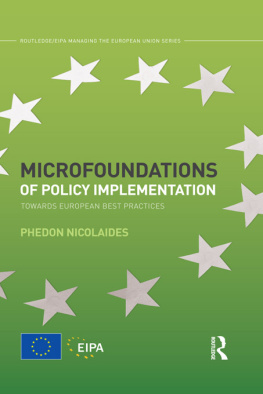Microfoundations of Policy Implementation
The EU has a compliance problem: there are persistent failures in the implementation of EU rules and policies by the member states. This book examines how policy implementation may be improved. It explains the nature of policy mistakes, proceeds to consider how individual public authorities and organizations can avoid making policy mistakes and then, in the light of its findings, derives how the EU may induce its member states and their public authorities to improve their compliance with EU rules and policies.
This is a book about how the right incentives at national level can improve institutional performance and contribute towards more effective application of EU rules across member states without having to confer new competences to the EU. Its premise is that strengthening the capacity of organizations to learn should not only lead to better performance, but should also stimulate useful policy experimentation across the EU.
Although this volume focuses on the obligations of EU membership and how to strengthen compliance, the proposed solutions have broader applicability. Improved organizational capacity for policy implementation will also be beneficial in those areas where the EU has no formal competence. Just as member states can learn from each other, so can policy officials in different policy fields. Good practices can spread.
Phedon Nicolaides, currently in Bruges, was formerly a professor at the European Institute of Public Administration, Maastricht, the Netherlands, where he wrote this manuscript. He was educated in the USA, the Netherlands and the United Kingdom and holds a PhD in economics and a PhD in law. He was previously affiliated with the Trade Policy Research Centre (London), the London Business School, the Royal Institute of International Affairs (London), the Cyprus Ministry of Foreign Affairs and the Cyprus Shipping Council. He is a member of the editorial boards of a number of academic journals and has published extensively on European Union policies and in particular on competition policy and policy implementation.
Routledge/EIPA Managing the European Union Series
Series Editors: Simon Duke and Cosimo Monda
This series is linked by a common theme which reflects the special expertise of the European Institute of Public Administration (EIPAthe leading centre of European learning and development for the public sector): bridging theory and practice regarding the management of the European Union (EU).
The contributions to the series explore specific aspects of this common theme by examining relations between and within the EU institutions themselves, between the institutions and the member states, and between the EU and its global partners, as appropriate in each case. The theme applies with equal validity to specific issues or policy areas, ranging from the budget, to the internal market, and to how the EU should respond to broader global changes. The implementation of the Lisbon Treaty, the global financial crisis and the associated cuts in the public sectors throughout the EU, as well as rapid changes in the international order, all demand fresh thinking and perspectives on managing the EU at a time of upheaval and transition.
The volumes in the series are each written primarily with public servants in mind, not only in the EU institutions themselves, but also the civil services of the member states and beyond. For this reason, the emphasis is upon analysing issues and challenges in the context of public administration and offering practice-oriented conclusions. The series is also designed to appeal to a more general readership who may wish to benefit from the clear identification and incisive analysis of these questions.
Microfoundations of Policy Implementation
Phedon Nicolaides
Managing the European Union System
Decision-making after Lisbon
Edward Best and Sabina Kajnc
Managing the European Unions Policies
The role of the EU agencies
Michael Kaeding
Managing Delegated and Implementing Acts
Edward Best and Michael Kaeding
Managing the European Union Budget and Finances
Theo Jans
Managing Administrative Co-operation
Danielle Bossaert
Managing the European Unions External Actions
Simon Duke
First edition 2013
Routledge
2 Park Square, Milton Park, Abingdon, OX14 4RN, United Kingdom
Simultaneously published in the USA and Canada
By Routledge
711 Third Avenue, New York, NY 10017, USA
Routledge is an imprint of the Taylor & Francis Group, an informa business
2013 European Institute of Public Administration.
All rights reserved. No part of this publication may be reproduced, stored in a retrieval system, or transmitted in any form by any means, mechanical, photocopying, or otherwise, without prior written permission of EIPA. For translation or reproduction rights please contact: European Institute of Public Administration, O.L. Vrouweplein, PO Box 1229, 6201 BE Maastricht, the Netherlands.
The publishers make no representation, express or implied, with regard to the accuracy of the information contained in this book and cannot accept any legal responsibility for any errors or omissions that may take place.
Trademark notice: Product or corporate names may be trademarks or registered trademarks, and are used only for identification and explanation without intent to infringe.
ISBN: 978-92-9203-020-9 (hbk)
ISBN: 978-92-9203-021-6 (ebk)
Library of Congress Cataloging in Publication Data
Nicolaides, Phedon.
Microfoundations of policy implementation / Phedon Nicolaides. 1st ed.
p. cm.
Includes index.
1. European Union. 2. Political planningEuropean Union countries. 3. European
Union countriesPolitics and government. I. Title.
JN30.N533 2012
320.6094dc23
2012026908
Typeset in Minion and Times New Roman
by Taylor & Francis Books
Foreword
The European Union (EU) has a compliance problem. There are persistent failures in the implementation of EU rules and policies by the member states. In this book I examine how policy implementation could be improved.
Most books on this subject start with a review of the obligations that the EU imposes on its members and then derive what member states and national authorities should do to comply with those obligations. This book begins at the opposite point. It explains the nature of policy mistakes, proceeds to consider how individual public authorities and organizations can avoid making policy mistakes and then, in the light of its findings, derives how the EU may induce its member states and their public authorities to improve their compliance with EU rules and policies.
My motivation for writing this book is to find a solution for the puzzle of compliance. Perfect compliance, like perfect behaviour, is an unachievable aim. It is natural that member states sometimes fail to apply EU rules correctly, but the occasional error is not really a matter of concern. What is far more worrying is the persistent failure of national authorities to come to grips with recurring problems. This failure is very puzzling for at least two reasons: first, national authorities encounter such problems quite frequently; and second, these problems are widely reported and analysed so national authorities ought to be prepared to deal with them. I will argue that these mistakes are fairly predictable and cannot be regarded as unforeseen mishaps. They reveal systemic or institutional failure.









